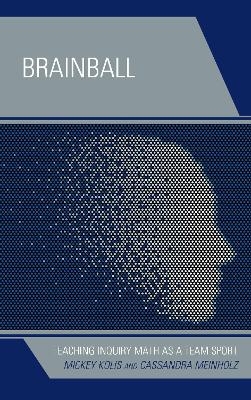
Brainball
Rowman & Littlefield (Verlag)
978-1-4758-4513-6 (ISBN)
Inquiry is becoming more and more an area of interest for educators. This book attempts to explain why math inquiry makes sense, what pieces are required to do math inquiry effectively (the knowledge, skills and dispositions), and then provides a series of day-by-day lesson plans.
Mickey Kolis is the author of eight books and a veteran public school teacher; he is currently a university professor. Making learning relevant is his highest professional aspiration. Cassandra Meinholz has taught high school mathematics since 2008. She currently teaches and lives in Fall Creek, Wisconsin with her husband and two sons.
Foreword
Acknowledgements
Introduction
Section 1: Brainball (Math Edition) - Why Social Studies Matter
Chapter 1: Brainball (Math Edition) – The Point of the Game is Learning
Chapter 2: The Big Ideas: Product, Process, and Community aligned with Purpose
Chapter 3: Brainball (Math Edition) Beliefs (Dispositions)
Chapter 4: Brainball (Math Edition) Key Knowledge Categories
Chapter 5: Brainball (Math Edition) Skills
Section 2: Preparing to Coach the Game
Chapter 6: Tip 1: Keep the End-in-Mind
Chapter 7: Tip 2: Play the Game
Chapter 8: Tip 3: Competitions as Evaluations
Chapter 9: Tip 4: Sequences matter
Chapter 10: Tip 5: Explicit Communications
Section 3: Day-to-Day Lesson Plans: Brainball Illuminated
Chapter 11: Algebra:
Lesson 1: Cups challenge
Lesson 2: Observations
Lesson 3: Dependent vs Independent Variables
Lesson 4: Writing Problem Statements
Lesson 5: Picking Problem Statements
Lesson 6: Statistical Investigation
Lesson 7: Gathering Information: Linear Models
Lesson 8: Gathering More Information: Residuals
Lesson 9: Gathering More Information: Go Least Squares Regression Line
Lesson 10: Gathering More Information: Residual Plots
Lesson 11: Gathering More Information: Correlation Coefficient
Lesson 12: Gathering More Information: Association Doesn’t Imply Causation
Lesson 13: Gathering More Information: Correlation Coefficient Squared
Lesson 14: Team Assessment
Lesson 15: Individual Assessment: Barbie Bungee
Chapter 12: A Geometry Example
Conclusion
Appendices
Appendix A: Cups Challenge Team Role Cards
Appendix B: Team Role Cards
Appendix C: Correlation Stations Directions
Appendix D: Association Toolkit
Appendix E: Independent and Dependent Variables Matching Cards
Appendix F: Team Project Scoring Guide
Appendix G: Observations Handout
Appendix H: Idea Evaluator
Appendix I: Colors Activity Data Table
Appendix J: Lines of Best Fit Examples
Appendix K: You are What you Eat
Appendix L: Fortune Cookie Questions
Appendix M: Go Crickets! Handout
Appendix N: Olympics Handout
Appendix O: Scatter Plot and Residual Plot Matching Cards
Appendix P: Correlation Coefficient Matching Cards
Appendix Q: Correlation Coefficient Activity
Appendix R: Arm Span vs Height Activity Handout
Appendix S: The Barbie Bungee Drop Handout
Appendix T: Spaghetti Marshmallow Challenge Role Cards
Appendix U: Quadrilateral Toolkit
| Erscheinungsdatum | 20.10.2018 |
|---|---|
| Verlagsort | Lanham, MD |
| Sprache | englisch |
| Maße | 159 x 237 mm |
| Gewicht | 503 g |
| Themenwelt | Schulbuch / Wörterbuch |
| Geisteswissenschaften ► Psychologie ► Pädagogische Psychologie | |
| Medizin / Pharmazie ► Medizinische Fachgebiete ► Psychiatrie / Psychotherapie | |
| Sozialwissenschaften ► Pädagogik | |
| ISBN-10 | 1-4758-4513-8 / 1475845138 |
| ISBN-13 | 978-1-4758-4513-6 / 9781475845136 |
| Zustand | Neuware |
| Haben Sie eine Frage zum Produkt? |
aus dem Bereich


